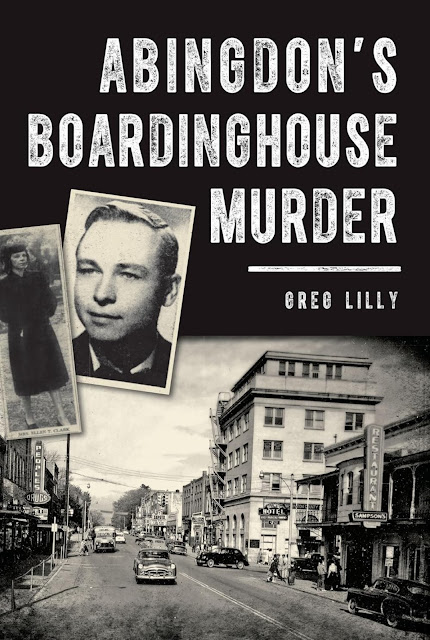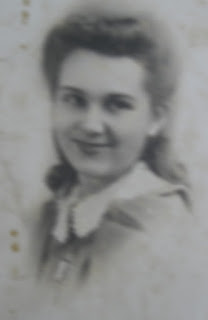For Immediate Release
Historical True Crime Book Wins the Macavity Award
Abingdon’s Boardinghouse Murder named best
mystery-based nonfiction

October 27, 2025
Abingdon,
Va.– Greg Lilly’s historical true crime book, Abingdon’s Boardinghouse
Murder, has been named the winner of the 2025 Macavity Award for Best
Mystery-related Nonfiction/Critical book.
The
Macavity Award honors the “mystery cat” of T.S. Eliot (Old Possum’s Book of
Practical Cats). Each year the members of Mystery Readers International
nominate and vote for their favorite mysteries from the previous year. The
awards consist of five categories: Best Mystery Novel, Best First Mystery, Best
Mystery Short Story, Best Historical Novel, and Best Mystery-related
Nonfiction/Critical.
“I’m
thrilled Abingdon’s Boardinghouse Murder won the Macavity for
nonfiction,” Greg Lilly states. “When the finalists were announced earlier this
year, I was honored to be listed with such gifted writers and meticulous
researchers.”
Abingdon’s
Boardinghouse Murder was published by the History Press in May 2024. The historical true
crime book has been shortlisted for the Agatha (Malice Domestic convention) and
the Anthony (Bouchercon) awards.
Lilly
first heard about the local tale when he moved back to Southwest Virginia. “Our
real estate agent drove us around Abingdon. He pointed out a home on Valley
Street and casually said, ‘The murder house is available.’ We passed on that
opportunity. We bought a house a couple of blocks away.” During the pandemic,
the spark to research the historic crime ignited. “The new owners of that house
had a Fourth of July cookout. Neighbors from up and down the street attended,
and the conversation soon turned to the house’s history. Everyone had a theory
or a really good story about the trial and conviction of the woman who ran the
boardinghouse in 1945.”
The
time period intrigued Lilly. “This tale had all the elements of historical
fiction with the twists of a true story. The Great War (WWI), Spanish flu
pandemic, World War II, the changing role of women—all set the stage of the
culture that led to this tragedy,” Lilly says. “Plus, everyone still has an
opinion about Jimmy and Helen. Usually, those opinions were formed by
hand-me-down tales from grandparents or parents that had grown wilder with each
telling, as most storytelling does. I wanted to know the facts.”
Lilly
sees the genre of true crime in transition. Podcasts and streaming service
shows grew in popularity for more than a decade. The narration ranged in tone
from humorous to spooky to journalistic. The topics covered themes such as celebrity
cases, serial killers, stalking, police procedurals, or organized crime. This
is Lilly’s first true crime book. His previous books were historical and
contemporary fiction and mysteries. “My editor explained one of the reasons she
wanted me to write this book was because of my background in fiction that emphasized
character development, setting, conflict, and story structure.”
The
award recognition of Abingdon’s Boardinghouse Murder illustrates reader appreciation
for authenticity and respect. “True crime is about real people in tragic circumstances,”
Lilly says. “People make good decisions and flawed decisions. They have admirable
traits and bad traits. They are real. Writing about their situation and
outcome, I want to honor the dead, their descendants, and the ones they left
behind.”
Abingdon’s
Boardinghouse Murder is available at local bookstores and online at retailers such as Amazon.com
and BN.com. Contact Greg Lilly for virtual and in-person events at info@GregLilly.com
---About the Book---
Title: Abingdon's
Boardinghouse Murder
By Greg Lilly
Imprint: The History Press
ISBN: 9781467157322
Price: $24.99
Publication date: 05/20/2024
The
historical true crime explores the lives and conflicts of the victim and the
accused, as well as the culture, lore, and legends that have grown over the
past 80 years.
Author
Greg Lilly uses interviews and newspaper coverage of the murder, the
investigation and the trial to reveal the facts of the Abingdon boardinghouse
murder.
--- About the Author ---
Greg
Lilly grew up in Southwest Virginia then lived in Charlotte, North Carolina.
The rich storytelling tradition of the South captivated him, and he began
writing. He first turned to creating short stories after plot lines emerged
from the technical manuals he wrote for a large family-owned corporation. He
published short stories and the Derek Mason Mystery series.
Moving
to Sedona, Arizona, Greg chronicled the high desert characters–past and
present–in his novels. Greg relocated to Williamsburg, Virginia, where he wrote
and edited a monthly regional magazine. He’s the founder and past-president of
the Williamsburg Book Festival.
Today,
he lives and writes in Abingdon, Virginia.
---
About Mystery Readers International ---
Mystery
Readers International, the largest mystery fan/reader organization in the
world, is open to all readers, fans, critics, editors, publishers, and writers.
Started by Janet A. Rudolph in Berkeley, California, it now has members in all
50 of the United States and 18 foreign countries. Members vote each year to
nominate and select the winners of the Macavity Award.
https://mysteryreaders.org/macavity-awards/
--- About Arcadia Publishing – The History Press is an imprint of Arcadia Publishing ---
Arcadia Publishing is the nation’s leading publisher of
books of local nonfiction and rarely explored pockets of history. Our mission
is to connect people with their past, with their communities and with one
another. Arcadia has a catalog of thousands of titles exploring the story of
America one city, state, or county at a time.
https://www.arcadiapublishing.com/products/abingdons-boardinghouse-murder-9781467157322
Contact Information
Greg Lilly
info@GregLilly.com
www.GregLilly.com









